Do or Do Not, There Is No Try: Mastering Commitment in Business for Ultimate Success
Introduction
In business, as in life, half-measures rarely lead to fulfilling results. The mantra "Do or do not, there is no try" epitomizes the essence of full commitment—a philosophy that when adopted in a business context, can revolutionize not just outcomes but also the very culture of the organization. This article explores how businesses can implement this philosophy to foster decisiveness, ensure accountability, and ultimately drive success.
The Philosophy of Absolute Commitment in Business
This philosophy, rooted in decisiveness and backed by action, can reshape a company's trajectory. It means making well-informed decisions promptly and following through with relentless execution. Here’s how this principle applies across various facets of a business:
Strategic Decision-Making
Incorporating absolute commitment into strategic decision-making transforms planning into action. It involves:
Clear Objectives: Define explicit, measurable, and timely objectives that leave no room for ambiguity.
Action-Oriented Planning: Transition from what needs to be done to how it will be done effectively.
Resource Alignment: Allocate resources not just based on potential returns but with clear, committed action plans.
Leadership Impact
Leadership under this philosophy goes beyond guiding teams; it involves:
Visionary Leadership: Communicate a clear vision that encompasses definitive end goals, not just attempts.
Cultural Influence: Cultivate a culture where results are celebrated, and the process is optimized for efficiency.
Empowerment and Accountability: Empower teams with the tools and authority they need to execute tasks while holding them accountable for end results.
Psychological Impact on Teams
Adopting this no-try philosophy impacts team dynamics and individual psychology:
Boosts Confidence: Teams operating under clear directives understand their purpose and feel more confident in their roles.
Enhances Engagement: When success is defined as achieving specific results, employees are more engaged and driven.
Reduces Anxiety: Clear expectations reduce workplace anxiety, as employees understand exactly what is required of them.
Case Studies: Real-World Applications
Examine how global companies have successfully implemented this philosophy:
Amazon: Known for its leadership principle of "Bias for Action," Amazon encourages decisive decision-making and rapid experimentation, significantly reducing time-to-market for new products.
Nike: Nike’s approach to product development and marketing campaigns, characterized by the slogan "Just do it," emphasizes definitive actions over tentative efforts, creating a powerful brand resonance.
Challenges and Mitigation Strategies
While the benefits are compelling, the challenges of this philosophy are noteworthy:
Risk of Overextension
Mitigation: Implement strategic project management practices that prioritize projects based on their alignment with core business objectives and resource availability.
Innovation Stifling
Mitigation: Create 'safe spaces' for experimentation where failure is seen as a part of the learning process, thus encouraging innovation without fear of repercussions.
Employee Burnout
Mitigation: Develop comprehensive wellness programs that focus on work-life balance, recognizing the signs of burnout and proactive measures to address it.
Advanced Strategies for Implementation
To fully integrate this philosophy into your business operations, consider these advanced strategies:
Integrated Decision Frameworks: Use decision-making frameworks like RAPID to clarify roles in decision-making processes, ensuring that actions are taken swiftly and effectively.
Performance Metrics Redesign: Redesign performance metrics to focus on outcomes rather than just activities, reinforcing the importance of achieving results.
Continuous Feedback Mechanisms: Establish real-time feedback channels that allow for quick adjustments and continuous improvement in processes.
Conclusion
"Doing" rather than "trying" sets a definitive path forward for businesses aiming to not just survive but thrive in the competitive market landscape. By embedding a culture of decisiveness and accountability, businesses can achieve unparalleled growth and sustainability. Embracing this philosophy requires a shift in mindset from all levels of an organization, but the rewards justify the commitment.
